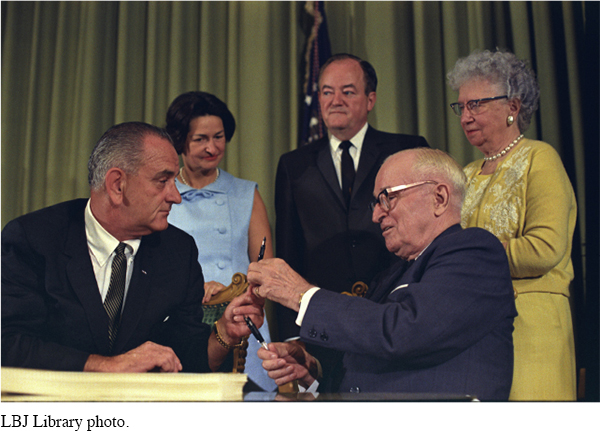Policymaking for a Great Society
As the 1964 election approached, Johnson projected stability and security in the midst of a booming economy. Few voters wanted to risk the dramatic change promised by his Republican opponent, Arizona senator Barry M. Goldwater, who attacked the welfare state and entertained the use of nuclear weapons in Vietnam. Johnson achieved a record-breaking 61 percent of the popular vote, and Democrats won resounding majorities in the House (295–140) and Senate (68–32). Still, Goldwater’s considerable grass-roots support marked a growing movement on the right (see “Emergence of a Grassroots Movement” in chapter 30) and a threat to Democratic control of the South.
“I want to see a whole bunch of coonskins on the wall,” Johnson told his aides, using a hunting analogy to stress his ambitious legislative goals for what he called the “Great Society.” The large Democratic majorities in Congress, his own political skills, and pressure from the black freedom struggle and other movements enabled Johnson to obtain legislation on discrimination, poverty, education, medical care, housing, consumer and environmental protection, and more. Reporters called the legislation of the Eighty-ninth Congress (1965–1966) “a political miracle.”
The Economic Opportunity Act of 1964 was the opening shot in the War on Poverty. Congress doubled the program’s funding in 1965, enacted new economic development measures for depressed regions, and authorized more than $1 billion to improve the nation’s slums. Direct aid included a new food stamp program, giving poor people greater choice in obtaining food, and rent supplements that provided alternatives to public housing. Moreover, a movement of welfare mothers, the National Welfare Rights Organization, assisted by antipoverty lawyers, pushed administrators of Aid to Families with Dependent Children (AFDC) to ease restrictions on welfare recipients. The number of families receiving assistance jumped from less than one million in 1960 to three million by 1972, benefiting 90 percent of those eligible.
Central to Johnson’s War on Poverty were efforts to equip the poor with the skills necessary to find jobs. His Elementary and Secondary Education Act of 1965 marked a turning point by involving the federal government in K–12 education. The measure sent federal dollars to local school districts and provided equipment and supplies to private and parochial schools serving the poor. That same year, Congress passed the Higher Education Act, vastly expanding federal assistance to colleges and universities for buildings, programs, scholarships, and loans.
The federal government’s responsibility for health care marked an even greater watershed. Faced with a powerful medical lobby that opposed national health insurance as “socialized medicine,” Johnson focused on the elderly, who constituted a large portion of the nation’s poor. Congress responded with the Medicare program, providing the elderly with universal medical insurance financed largely through Social Security taxes. A separate program, Medicaid, authorized federal grants to supplement state-paid medical care for poor people. By the twenty-first century, these two programs covered 87 million Americans, nearly 30 percent of the population. [[LP Photo: P28.04 Medicare Becomes Law /

Whereas programs such as Medicare fulfilled New Deal promises, the Great Society’s civil rights legislation represented a break with the past. Racial minorities were neglected or discriminated against in many New Deal programs; by contrast, the Civil Rights Act of 1964 made discrimination in employment, education, and public accommodations illegal. The Voting Rights Act of 1965 banned literacy tests and other practices used to disqualify black voters and authorized federal intervention to ensure access to the voting booth.
> CONSIDER CAUSE
AND EFFECT
What factors made it possible for Johnson to enact so many groundbreaking new policies between 1964 and 1968?
Another form of bias fell with the Immigration and Nationality Act of 1965, which abolished quotas based on national origins that discriminated against non–Western European immigrants. The law maintained caps on the total number of immigrants and, for the first time, included the Western Hemisphere in those limits; preference was now given to immediate relatives of U.S. citizens and to those with desirable skills. The measure’s unanticipated consequences triggered a surge of immigration in the 1980s and thereafter (see “The Internationalization of the United States” in chapter 31).
Great Society benefits reached well beyond victims of discrimination and the poor. Medicare covered the elderly, regardless of income. A groundswell of consumer activism won legislation making cars safer and raising standards for the food, drug, and cosmetics industries. Johnson insisted that the Great Society meet “not just the needs of the body but the desire for beauty and hunger for community.” In 1965, he sent Congress the first presidential message on the environment, obtaining measures to control water and air pollution and to preserve the natural beauty of the American landscape. In addition, the National Arts and Humanities Act of 1965 funded artists, musicians, writers, and scholars and brought their work to public audiences.
The flood of reform legislation dwindled after 1966, when Democratic majorities in Congress diminished and a backlash against government programs arose. The Vietnam War dealt the largest blow to Johnson’s ambitions, diverting his attention, spawning an antiwar movement that crippled his leadership, and devouring tax dollars that might have been used for reform (see “The Widening War at Home” in chapter 29).
In 1968, Johnson pried out of Congress one more civil rights law, which banned discrimination in housing and jury service. He also signed the National Housing Act of 1968, which authorized an enormous increase in low-income housing—1.7 million units over three years—and put construction and ownership in private hands.
Understanding the American Promise 3ePrinted Page 800
Section Chronology